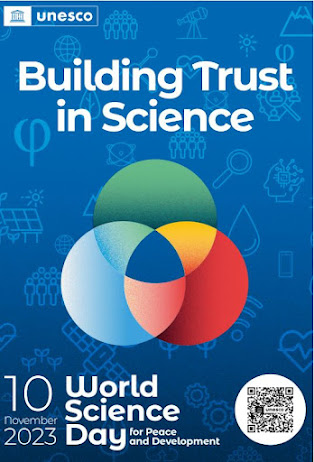EVENTS: On November 13th, you are invited participate to the High-level roundtable on the occasion of the World Science Day for Peace and Development 2023; The Panel discussions entitled “Building Trust in Science at the Nexus of Science; Policy and Society.” starts at 6:30pm at UNESCO Conference Room II. The High-level roundtable aims to explore the parameters contributing to building and preserving trust in science. The roundtable will offer an opportunity to discuss the links between science, policy, society, and science-based policy making, and to gain a better understanding of the status of scientific research. It will also highlight the importance of freedom and safety of scientists, as a key ingredient for science ecosystems driven by universal values, and the vital role of science popularization in enhancing scientific literacy, raising public awareness and trust in science. These principles are laid down in two UNESCO standard-setting instruments: the Recommendation on Science and Scientific Researchers (2017) and the Recommendation on Open Science (2021). These instruments articulate a vision where science ecosystems are driven by universal values and aim at making science and its benefits accessible to all.
Agenda Programme of the World Science Day for Peace and Development 2023 celebration.
Building Trust in Science at the Nexus of Science, Policy and Society (high-level roundtable)- Registrate to participate to the ” 2023 Journée mondiale de la science + Prix UNESCO-Kalinga”.
Ceremony of the 2023 UNESCO Kalinga Prize for the Popularization of Science - Watch the “2023 World Science Day + UNESCO-Kalinga Prize” live webcast!
Science holds the undeniable potential to change our world for the better. Vaccines, for instance, have played a critical role in curbing the spread of diseases such as COVID-19, measles, and polio. Innovations in energy and agriculture have led to increased crop yields while reducing the use of pesticides, fertilizers, and water. Central to these breakthroughs is scientific research, which drives all major leaps in understanding. To underline its immense potential, UNESCO celebrates World Science Day for Peace and Development every year. This year, we also celebrate the International Year of Basic Sciences for Sustainable Development, which will transition into the International Decade of Sciences for Sustainable Development (2024-2033).At the heart of UNESCO’s endeavours to support science and scientific research is our Recommendation on Open Science, adopted in 2021. This text underscores that, to unlock the potential of science, scientists need access to data, funding and equipment. They need to collaborate with their peers if they are to accelerate progress and bridge technological and knowledge gaps in and between countries.The Recommendation also underlines the importance of making science more open to marginalized groups, particularly women and indigenous people. Indeed, according to the UNESCO Science Report, only one in three researchers is female. UNESCO is therefore working to foster gender equality in science – for example, through initiatives in Africa and the Caribbean with the L’Oréal Foundation. Over the past 25 years, this partnership has bolstered the careers of over 4,100 female scientists from more than 110 countries.Importantly, the Recommendation underscores the importance of public trust in science: a wider understanding that science is a continuous quest for truth entailing a process of trial and error. This issue is also the theme of this World Science Day – and the focus of a ministerial roundtable at UNESCO Headquarters on 13 November 2023. This event aims to build trust in science by addressing questions such as scientific literacy and the alignment of science with societal needs, as well as the freedom and safety of scientists.In our rapidly changing world, supporting scientific development and fostering an understanding of science are imperatives, not mere options. UNESCO therefore advocates for increased funding for scientific research, a higher representation of women in science, wider access to quality science education for all, and public engagement in scientific processes. Science that is more open, better funded and more equitable is the science the world urgently needs.
Ms Audrey Azoulay, Director-General of UNESCO.



No comments:
Post a Comment